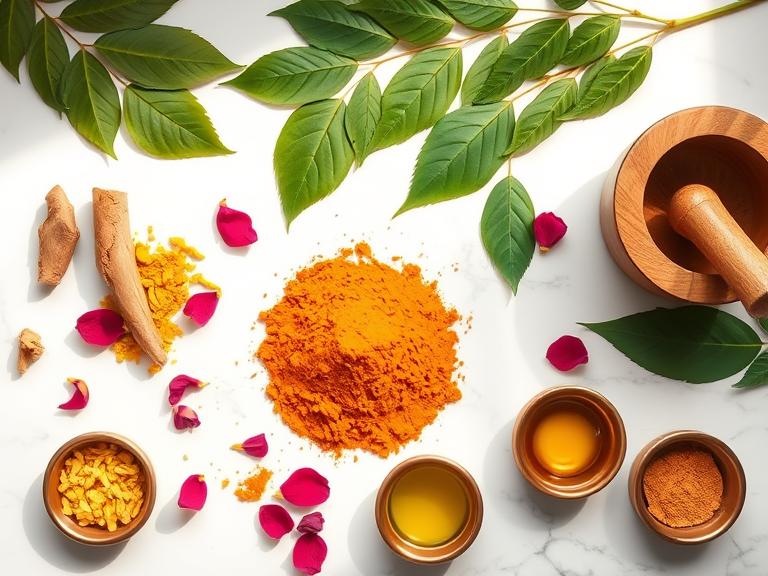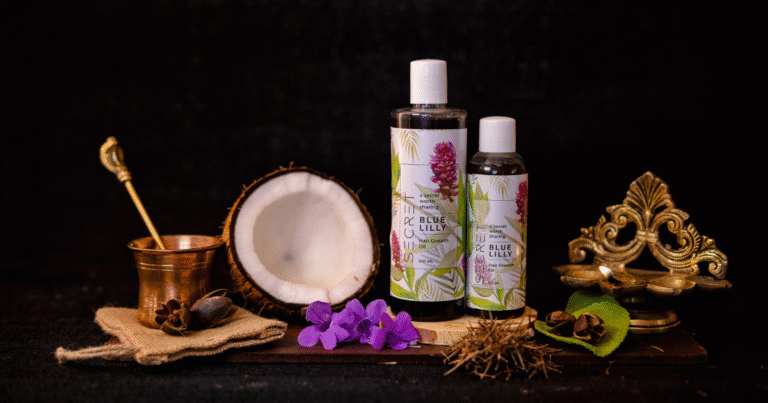In a world brimming with synthetic skincare solutions, the ancient wisdom of Ayurveda offers a refreshing, natural approach to skin health. Rooted in the belief that true beauty emanates from inner balance, an Ayurvedic skin care routine emphasizes harmony between the body, mind, and environment.
Table of Contents
Key Takeaways
- Personalized Care: Ayurveda tailors skincare routines based on individual doshas—Vata, Pitta, and Kapha—ensuring treatments align with one’s unique constitution.
- Natural Ingredients: Utilization of herbs and natural substances like neem, turmeric, and sandalwood promotes skin health without harmful chemicals.
- Holistic Approach: Beyond topical treatments, Ayurveda incorporates diet, lifestyle, and mental well-being into skincare, recognizing their interconnectedness.
- Preventative Focus: Emphasis on maintaining balance to prevent skin issues, rather than solely treating symptoms.
Understanding the Ayurvedic Philosophy in Skin Care
Ayurveda, translating to “the science of life,” is a 5,000-year-old system of natural healing originating in India. It posits that health and wellness depend on a delicate balance between the mind, body, and spirit. Central to this philosophy are the three doshas:
- Vata: Composed of air and space, governing movement and communication.
- Pitta: Made of fire and water, overseeing digestion and metabolism.
- Kapha: Formed from earth and water, responsible for structure and lubrication.
Each individual possesses a unique combination of these doshas, influencing their physical and emotional characteristics, including skin type.
The Importance of Dosha Balance in Skin Health
An imbalance in one’s dosha can manifest as various skin issues:
- Vata Imbalance: Leads to dry, rough, and flaky skin.
- Pitta Imbalance: Results in redness, inflammation, and sensitivity.
- Kapha Imbalance: Causes oily skin, clogged pores, and acne.
Understanding your dominant dosha is crucial for selecting appropriate skincare practices and remedies.
Core Components of an Ayurvedic Skin Care Routine
An effective Ayurvedic skin care routine encompasses several key practices:
1. Cleansing
Gentle cleansing removes impurities without stripping the skin’s natural oils. Herbal powders like gram flour and neem are commonly used.
2. Exfoliation
Regular exfoliation with natural ingredients such as oatmeal or almond meal helps eliminate dead skin cells and promote circulation.
3. Toning
Herbal toners like rose water or witch hazel balance the skin’s pH and tighten pores.
4. Moisturizing
Applying oils suited to one’s dosha—sesame oil for Vata, coconut oil for Pitta, and sunflower oil for Kapha—nourishes and protects the skin.
5. Herbal Masks
Weekly turmeric, sandalwood, and multani mitti masks address specific skin concerns and dosha imbalances.
Integrating Lifestyle and Diet
Ayurveda emphasizes that external skincare must be complemented by internal balance:
- Diet: Consuming foods that pacify one’s dominant dosha supports skin health. For instance, cooling foods benefit Pitta types.
- Hydration: Drinking ample water and herbal teas aids in detoxification.
- Sleep: Adequate rest allows the body to repair and rejuvenate the skin.
- Stress Management: Practices like yoga and meditation reduce stress, a common trigger for skin issues.
Embracing Ayurveda for Radiant Skin
Adopting an Ayurvedic skin care routine is more than a beauty regimen; it’s a commitment to holistic well-being. By aligning with nature’s rhythms and understanding one’s unique constitution, individuals can achieve not only glowing skin but also enhanced overall health.
Note: For personalized advice, consult with a qualified Ayurvedic practitioner to determine your dosha and appropriate skincare practices.
Ayurvedic Skin Care Routine Based on Doshas
Understanding your dosha is like discovering your skin’s personal instruction manual. Ayurveda doesn’t believe in “one-size-fits-all”—and that’s the beauty of it. Here’s how to tailor your skincare the Ayurvedic way:

Vata Dosha Skin Care Routine (Dry, thin, prone to flakiness and premature aging)
Morning Routine:
- Cleanse with raw milk or oatmeal paste—gentle and nourishing.
- Apply a light coat of warm sesame oil before a bath to hydrate deeply.
- Mist skin with rose water to keep it dewy.
- Use a rich herbal moisturizer—look for ingredients like ashwagandha, shatavari, or aloe vera.
Night Routine:
- Oil massage with almond or avocado oil.
- Weekly banana-honey mask for hydration.
- Avoid harsh soaps or drying treatments.
Pitta Dosha Skin Care Routine (Sensitive, oily T-zone, prone to redness and breakouts)
Morning Routine:
- Wash with neem or sandalwood powder.
- Use cucumber juice or mint water as a toner.
- Moisturize with coconut oil or aloe vera gel.
- Avoid sun exposure during peak hours—Pitta skin is reactive.
Night Routine:
- Apply a calming turmeric and yogurt mask.
- Keep skin cool with rose or chamomile water sprays.
- Sleep on time—Pitta needs routine to stay calm.
Kapha Dosha Skin Care Routine (Oily, thick, prone to acne and enlarged pores)
Morning Routine:
- Cleanse with multani mitti or triphala powder.
- Use apple cider vinegar toner (diluted) to refine pores.
- Avoid heavy creams—opt for light herbal emulsions with manjishtha or lodhra.
Night Routine:
- Exfoliate 2-3 times a week with chickpea flour and turmeric.
- Clay masks with neem, basil, or camphor help purify.
- Stay active—Kapha thrives with movement.
Best Ayurvedic Skin Care Home Remedies
Let’s get into the good stuff—easy, effective, and completely natural home remedies using kitchen staples. These remedies work with your skin, not against it.
| Skin Issue | Ayurvedic Home Remedy | Key Ingredients |
|---|---|---|
| Acne | Neem-turmeric face pack | Neem leaves, turmeric, rosewater |
| Pigmentation | Sandalwood pack | Sandalwood, milk, turmeric |
| Dryness | Banana-honey mask | Ripe banana, honey |
| Oily Skin | Multani mitti scrub | Fuller’s earth, lemon juice |
| Redness | Cucumber-rose gel | Cucumber pulp, rose water, aloe vera |
Bonus Tips:
- Rub a raw potato slice under the eyes to reduce dark circles.
- Apply honey directly on pimples for an overnight healing effect.
- Soak saffron in milk overnight, apply the next morning for a glow boost.
A Simple Ayurvedic Skin Care Routine at Home (Morning to Night)
Here’s a go-to daily routine anyone can follow with Ayurvedic principles in mind:

Morning Ritual
- Wake up early: Around 6 AM, aligning with the body’s natural rhythm.
- Oil Pulling: Swish sesame or coconut oil to detox.
- Ubtan Cleanser: Mix gram flour + turmeric + milk for a mild exfoliating cleanser.
- Hydrosol Mist: Spray rose or tulsi water as a toner.
- Moisturize: Use dosha-appropriate oil or cream.
- Sun protection: Apply natural sun protectants like sandalwood paste or aloe vera.
Night Ritual
- Gentle cleanse: Use raw milk or herbal face wash.
- Steam once a week: With neem or tulsi leaves for deep cleansing.
- Apply a soothing mask: 2-3 times a week depending on skin type.
- Moisturize deeply: Massage with oil to calm nerves and nourish skin.
Ayurvedic Skin Care Tips You Can Actually Stick To
Because skin care shouldn’t feel like rocket science. Here are real-world, easy-to-implement Ayurvedic tips:
- Eat seasonal fruits and vegetables—nature knows what your skin needs.
- Avoid eating too much spicy, oily, or processed food—they throw doshas off balance.
- Drink warm water with lemon in the morning to flush toxins.
- Sleep by 10 PM—your skin regenerates at night.
- Practice abhyanga (self-massage) regularly—it’s like therapy for your skin and soul.
Related FAQs Answered (Based on Real Google Searches)
Q: How to take care of skin as per Ayurveda?
A: Discover your dosha, follow natural routines using herbs and oils, and maintain balance through diet and lifestyle.
Q: How to get fair skin through Ayurveda?
A: Ayurveda doesn’t chase fairness but focuses on radiance. Use saffron, turmeric, and milk-based masks for brightness. Glow, not bleach.
Q: What is the 7-step skin care routine in Ayurveda?
A:
- Cleansing with herbal powders
- Gentle exfoliation
- Toning with floral waters
- Oil massage
- Face masks
- Diet and hydration
- Stress management (yes, it shows on your face)
Q: How to create Ayurvedic skincare at home?
A: Mix herbs, oils, and natural ingredients like neem, aloe, and rose water. Start simple—a basic ubtan goes a long way.
Ayurvedic Skin Care Routine – Frequently Asked Questions (FAQ Table)
| Question | Ayurvedic Answer |
|---|---|
| Which Ayurvedic herb is best for glowing skin? | Manjishtha is widely used for enhancing complexion and clearing skin impurities. It’s known as a natural blood purifier. |
| Can I follow Ayurvedic skin care alongside modern products? | Yes—but stick to gentle, non-reactive modern products. Ayurveda emphasizes minimalism and skin compatibility. |
| How long does it take to see results? | With consistency, most people notice visible improvement in 3 to 6 weeks. Ayurveda works from the root, so patience pays off. |
| Is turmeric safe for all skin types? | Generally, yes. But if your skin is highly sensitive (especially for Pitta types), dilute it with yogurt, aloe, or milk. |
| Does Ayurveda recommend sunscreen? | Ayurveda traditionally uses natural sun protectants like sandalwood, aloe vera, or saffron. For extended sun exposure, you may combine with a safe mineral-based sunscreen. |
Final Thoughts: Ayurveda Isn’t Just Skin Care—It’s Soul Care
Ayurvedic skin care routine isn’t about chasing trends—it’s about tuning into your body’s rhythm. When your doshas are balanced, your skin glows from the inside out. The best part? You don’t need an army of products—just a few trusted herbs, oils, and routines that work with your skin.
Here’s a quick reminder of what matters most:
- Know your dosha and listen to your body.
- Nourish from within—what you eat shows up on your face.
- Be consistent—Ayurveda is slow, steady, and powerful.
- Simplify your routine—less is often more.
- Choose natural over chemical when possible.
For Further Reading:
- Atharapure.com/ayurveda skin care routine-a-step-by-step-guide
- The Ayurveda Institute/Ayurvedic Skin Care Routine: The Key to Glowing Skin
- Which Foods Reduce Inflammation in Ayurveda? A Comprehensive Guide to Healing from Within
Want Glowing Skin? Start With Balance, Not Bleach.
Ayurveda reminds us: real beauty is balanced beauty. Once your internal health syncs with your external routine, your skin naturally finds its way to radiance.





